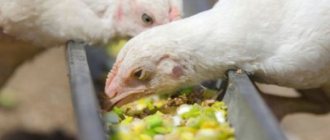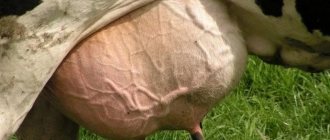1 518
no comments yet
0
Author of the article
Sadchikov Nikolay Alekseevich
Reading time: 3 minutes
Delayed physical development of young individuals indicates the presence of some disease in birds. This means that one or a number of conditions for keeping or feeding young chickens have been violated. The danger lies in the fact that the disease can develop and lead to death.
Incorrect incubation
If chicks do not grow well, the reason may be a violation of the incubation regime. When purchasing chicks from a manufacturer, the breeders do not know under what conditions the eggs were incubated or what material was used for hatching. In this case, it is almost impossible to do anything for the normal raising of healthy livestock. Violation of the regime will further affect the health of the young animals. This is due to hereditary factors and improper incubation.
Only high-quality eggs are selected for raising chickens. The chickens and roosters are monitored. To prevent family ties between them: it is necessary to form families correctly. The eggs are examined under a lamp or using an ovoscope.
- There should be no dark spots, clots or blood particles. The eggs are placed in the incubator.
- The next examination should be carried out after 2 weeks. The egg contains an embryo, and its heartbeat and movement can be detected. If there are no such signs of life, then the egg is discarded.
- After another week, the embryo is examined again. It should occupy the entire cavity of the egg.
Be sure to maintain a temperature regime in the incubator of 37.8 C. From the 19th day, the temperature is reduced by 0.2 degrees. The eggs must be constantly turned over so that they are well heated on all sides. Maintain a certain humidity in the incubator. It is 56%. When the temperature rises or falls, chicks may be born outwardly normal, but their development will be defective. Violation of the incubation regime will certainly affect the immunity and growth of the chicks.
When laying eggs in an incubator, you need to pay attention to which birds they were produced from. There should be no family ties between them. Otherwise, deformity or impaired development cannot be avoided. Keepers cannot know which birds produced the eggs. Subsequently, they may experience difficulties in caring for the young.
Poor quality care
Cleanliness of the premises is required. The litter should always be updated. Lay newspaper, cardboard or oilcloth with sawdust on the floor. The bedding is changed before each feeding. Moisture on the floor is unacceptable. It can lead to the development of helminths and pathogenic bacteria. Chicks become hypothermic on a wet floor.
If chickens grow poorly under normal conditions, what should you do in this case, where should you look for the cause? The reason may be hidden in vitamin deficiency. Meat breed chicks require more feed than egg-laying chickens.
The diet is saturated with protein feed and food additives of animal origin. Vitamins and mineral salts must be added to the food. Young animals will grow poorly if there is a lack of vitamins “A”, “B”, “D”. Vitamin deficiency will manifest itself in chickens not only in growth deficiency, but also in decreased immunity, loss of plumage, and peeling of the skin.
In good weather, if the ambient temperature is at least 22-25 C, the chicks are taken out into the fresh air. The box is taken outside or the livestock is placed in a closed cage. Walking is allowed from 3-5 weeks after birth. Sunlight promotes the production of vitamin D in the body. If it is not possible to take the chicks out for a walk, then an ultraviolet lamp is installed in the room. Irradiation is carried out daily for 5 minutes. in a day. Fish oil is added to the feed.
Already from 2-3 days, chickens of meat breeds begin to be given mash. They include skim milk or milk, millet, greens and grated carrots: it contains carotene, a growth vitamin. If, with proper nutrition, proper growth is not observed, then supplements with vitamin “A” are introduced into the diet.
Farmers believe that the answer to the question of why chickens do not grow lies most often in vitamin deficiency. Starting from the 2nd week, young animals add cake, yeast, and bran to the mash. These products are rich in vitamins B and E. Vitamin deficiency will slow down development, and there will be a deviation in the growth of muscle fibers and in the functioning of the nervous system. In case of acute deficiency of vitamins, it is recommended to feed young animals with the following drugs: “Calcium gluconate”, “Alpha-tocopherol acetate”, “Chiktonik”.
In order for the chicks to grow normally, greens must be added to their diet from 2 weeks. Nettle is best suited for broilers, but usually young animals are given green onions, dill, parsley, and alfalfa. These are natural vitamins that a growing body needs.
Why broilers do not gain weight main reasons:
- The room temperature is not correct.
For normal growth of broilers, the room in which they are kept must be warm. They need warmth constantly.
In the initial 2 weeks, chickens develop immunity. When the chicks freeze, they will not be strong. Please note that the temperature in the room with chickens should be 30 degrees Celsius.
After 14 days, the temperature can be reduced to 25 degrees Celsius.
In the first days of chicks, the light should be on all day long.
- Lack of calcium in the body of chicks.
Poor growth can often be associated with common vitamin deficiency.
It happens that chickens do not gain weight due to the fact that they need to drink or do not have enough food. Then the body seeks internal opportunities for the chick’s organs to develop, but there are no longer enough reserves for growth.
Helminths can infect the digestive tract of chickens, their crop and esophagus, so the development of birds occurs more slowly.
What to do if broilers begin to grow poorly?
You need to pay attention to the conditions in which broilers are located. The room must be at the required temperature without humidity. Protect young animals from drafts and install a ventilation system.
To provide the chicks with the desired temperature, you can install an oil radiator. Lamps with infrared radiation are perfect for this. They simultaneously illuminate and heat the room.
If broilers are not developing well, you should pay attention to the lighting in the room. For broiler development, the daylight hours should be approximately 17 hours.
It should be noted that bright light is also not required. It will irritate the young animals and can cause pecking. It is advisable to use soft light.
Lamps with blue and red light are suitable. This will create the required length of daylight hours and will also have a positive effect on the development of broilers.
Bird feeding must be of high quality. The food contains minerals, vitamins and calcium.
We recommend using mixed feed. This will give the chicks everything they need. When buying compound feed, please note that it must contain protein.
Calcium in the bird's body comes from chalk and eggshells, which must be included in the daily diet of broilers.
To improve digestion, crushed shells and crushed gravel are added to the food. This facilitates faster digestion of food, and, naturally, the young animals will grow faster.
Please note that feeding chickens in the first 7 days should be at least 8 times a day. After a week, you need to give food 6 times a day, in the third week - 4 times a day. It is necessary that the food includes greens, as they provide the chicks with the necessary vitamins.
As preventive measures, vitamins and antibiotics should be included in the diet of broilers. Remember that vaccinations are required and all birds must be examined by a professional veterinarian.
If broilers are sick with helminthiasis, you can treat the birds with Garlic Nilverm. This drug is sold in pet stores. The product should be mixed into wet food intended for birds.
Diseases
Prevents the growth of infection in the body. Young laying hens often do not begin to lay eggs after suffering from infectious diseases. They experience disruption of the reproductive organs and growth stops. Veterinarians recommend vaccination of egg-laying chickens. This will save the livestock from infection and mass mortality. Broilers are not vaccinated. They are given vitamin complexes and antibiotics.
If growth retardation is observed in the entire population, and not in individual individuals, then the cause may not only be infectious diseases. Birds often suffer from coccidiosis. It is caused by parasites. They end up in the chicken coop along with low-quality food and dirt.
For chickens that are 2 months old, a container with ash and sand is placed in the room if they are meat birds. Individuals must take ash baths to cleanse their feathers of parasites. For laying hens, such a container is installed after six months. Small chicks can eat a lot of sand, which can cause intestinal upset.
There are anomalies in the chickens that confuse the palace officials. All sanitary standards and feeding rules are observed in the chicken coop, but one chicken is not growing well. His goiter quickly clears, and frequent stools of normal color and consistency are noted. Diseases are excluded.
Such individuals have an accelerated metabolism. They eat a lot of food, but their muscle fibers do not grow, and they do not gain weight. They may experience skeletal growth. The chick may never grow up, but will always remain a chicken. Sometimes there is rapid growth after puberty, at 7-8 months of age, but this is rare.
Read also: Hungarian white geese
Unfortunately, farmsteaders do not always buy healthy livestock. Incorrectly selected eggs, violation of the incubation regime, incest - all this leads to abnormalities in the development of the young. Much depends on the poultry farmers themselves. Compliance with the regime is a key factor for the proper growth of chickens.
Conditions for growth
If the chickens are not growing well, you need to check the living conditions and, if necessary, adjust the care.
Temperature conditions. The first 14 days - 30℃, then at least 25℃. The lamps must be on 24 hours a day.
Vitamins and minerals, including Calcium, are added to the food of young individuals for rapid and high-quality growth. They give food on schedule (8 times a day), in plentiful quantities. To increase appetite, sweeteners are used, then chickens are more willing to eat regular food.
The first month is the most important month in the life of chickens, so special attention should be paid to them during this period.
In the first days of life, chickens are treated with antiparasitic drugs. Pay attention to stool and general condition to avoid infections. The final rule is to keep young animals isolated until they reach a certain age.
How to tell if a chicken is growing correctly
Different breeds have their own standards, but most often poultry farmers take one of the varieties of broilers.
The farmer should keep a notebook in which the type of feed, its quantity, and weight gain are noted. For example, at 10 days a chicken should weigh about 200 grams. To achieve this, you need to add fish waste, herbs, and boiled vegetables to your diet. At the age of 3 weeks, the weight of the broiler should reach 0.5 kg. This means that development is proceeding correctly and he will gain the necessary mass. Slaughter can begin as early as one month of age. Some farmers believe that meat is especially tasty during this period. The weight of the carcass reaches 1 kg. But still, most owners continue to work, because in just a month the bird gains three times its weight.
By 3 months, a properly raised broiler can weigh between 4 and 5 kg. Mass slaughter is carried out after 55 days, since there is no point in feeding the birds further - growth stops.
Conclusion
If broilers do not grow, any owner wants to understand the reasons in order to avoid repeating their own mistakes in the future.
Most often, they are completely correctable, since they are caused by inexperience or carelessness. Therefore, you should not give up - everything will definitely work out next season!
Maintenance of adult broilers
If broilers do not grow well and laying hens produce few eggs, in this case we recommend paying special attention to the living conditions. An adult bird is still growing and requires good conditions to gain weight:
Rejected broilers (those with genetic diseases) will not reach standard size in the future. If kept in good conditions, you can get medium-sized chickens, but their development will not be complete.
Diseases such as rickets and vitamin deficiency are very difficult to cure, so the disease should be prevented through preventive measures. It is important to adhere to the rules of feeding chickens, introducing a sufficient amount of vitamins into the diet.
Regular examination by a veterinarian is necessary even for healthy livestock. To protect animals from diseases, you can vaccinate or sometimes get tested for parasites. They use traditional methods to accelerate weight gain, but antibiotics and vitamin complexes are more credible.
How much should broilers weigh?
Growing broilers has its own characteristics. When properly maintained, chickens gain weight steadily. A special table helps you monitor proper weight gain. All information about the gain of live weight by broilers is entered into it. Ideally, broilers should grow in weight as follows:
- in two weeks – 500 grams;
- at 1 month – 1.5 kilograms;
- at 2 months – 3 kilograms;
- at 3 months – 5 kilograms.
Of course, such a good weight gain is determined by ideal housing and feeding conditions. In practice, the numbers may look somewhat more modest, but there should not be a big difference in the indicators.
It is worth noting that some farmers slaughter birds already at 50–55 days of life. Although broilers do not yet gain maximum weight by this age, the meat turns out to be very tender and dietary.
In any case, keeping broilers for more than 80 days is unprofitable . Meat breeds rarely gain more than 6 kilograms of weight, and the meat loses its beneficial properties and quality.
Currently, hybrid varieties of broilers are very popular on farms. They were bred by crossing different meat breeds. Even compared to early maturing broilers, hybrid chickens look very attractive in terms of weight gain.
Weight standards for broiler chickens
Broilers are genetically endowed with the ability to grow quickly. Scientists are constantly improving meat breeds of chickens and creating new ones, trying to reduce the fattening time. If earlier representatives of meat breeds of chickens were ready for slaughter at the age of 60–63 days, then modern broilers do not need to be fed for more than 40–45 days.
Chickens are born weighing 40–44 g; after 10 days their weight increases 6 times and reaches 200–240 g. Cockerels are slightly heavier than hens. At ten days of age, the difference in their weight is about 30 g.
After another 10 days, the weight of the chicks increases by another 500 g and amounts to 750–800 g. This is the norm, but there are exceptions, for example, there is a known case that occurred in Veliky Novgorod. Local poultry farmers managed to fatten a three-week-old chicken to 2 kg.
Attention! Accelerated growth negatively affects the musculoskeletal system of birds, so farmers try to limit the activity of birds. They arrange chicken coops so that the feeders are in close proximity to the birds.
The broiler weight continues to increase rapidly up to 2.5 months. At the age of 30 days, the normal weight of a chicken reaches 1550–1600 g. Meat breed chickens are usually fattened for 40–50 days. In the future, their growth slows down, but their appetite remains the same, so feeding the young animals longer is unprofitable.
How to determine the weight of a chicken?
Broiler farmers must constantly monitor the weight of their chickens. If young animals grow poorly, this will certainly affect profits. It is convenient to use electronic scales to weigh chickens; they are more accurate.
Control measurements of broiler weight are carried out at regular intervals - every 7-10 days. It is correct to weigh chickens in the morning, when they have not yet received their first portion of feed. Chickens of meat breeds have a calm disposition, so they are simply placed on a scale and the indicators are recorded.
If the chicken does not want to sit, you can use other weighing methods:
- Place the bird in the box, put it on the scale and record the result. Then determine the mass of the empty box and subtract it from the original value.
- Place the chicken in a cloth bag and weigh it using an electronic steelyard, hanging it by a hook. In this case, you also need to subtract the weight of the empty bag from the result obtained.
Causes of underweight in broilers
If during control weighing it turns out that broilers are not gaining weight, it is important to figure out what is causing this. The following factors influence live weight gain:
- unbalanced diet;
- temperature conditions in the chicken coop;
- digestive problems in chickens;
- spacious walk.
Read also: Is it possible to feed broilers a variety of foods?
Attention! Broiler chicken breeds differ in the rate of increase in muscle mass. Some grow rapidly, others more slowly. It is important to clarify this issue when purchasing chickens.
Incorrectly composed diet
Another reason for weight loss is frequent changes in feed. As a result of a sudden change in diet, the birds become stressed and, as a result, broilers eat poorly. Also, the rate of feed consumption per bird affects the increase in muscle mass. If a farmer tries to save money by filling the feeders only 2/3 full, then the chickens are undernourished and therefore grow slowly.
Temperature conditions in the chicken coop
Broilers react sharply to temperature disturbances in the poultry house. In the cold season, the thermometer in the chicken coop should not fall below +20 degrees. Otherwise, the birds will spend the energy obtained from food not on weight gain, but on heating the body.
Attention! For broilers, not only low temperature is dangerous, but also its fluctuations. Sudden changes cause stress in birds, which subsequently affects productivity.
The level of humidity in the room also affects the health of birds. In a damp poultry house, the threat of the spread of infectious and colds increases. A chicken coop for broilers must be equipped with supply and exhaust ventilation.
Digestive problems in chickens
Fungus-contaminated feed can cause serious digestive problems in young animals. By eating rotten grain that has not been stored properly, chickens suffer from dyspepsia and intoxication. The birds' appetite decreases, diarrhea begins, and nutrients are poorly absorbed by the body. As a result, the bird not only does not gain weight, but also loses weight.
Another reason for underweight in broiler chickens is helminthiasis. Infection with worms occurs through dirty bedding, and some parasitic infections are transmitted through eggs from laying hens. Common types of helminthiasis:
Common signs of helminth infection are loss of appetite, lethargy, diarrhea, and exhaustion. If you find similar symptoms, you should invite a veterinarian to make a diagnosis and prescribe treatment.
Spacious walking area
Unlike chickens of egg and meat-egg breeds, broilers do not need a spacious area for walking. An active lifestyle leads to high calorie consumption, which negatively affects weight gain. Ideally, meat chickens are kept in cages to limit their ability to move.
Causes of poor growth of chickens
Active growth of young animals is observed in the first weeks of life. If all maintenance conditions are met, weight gain occurs quickly. But if mistakes were made in some way, development may slow down or stop. The causes of developmental disorders are described below.
Biological
Deviations in the development of the chick may occur if:
- the selected egg had defects and were not noticed during selection;
- the egg was improperly stored during the pre-incubation period;
- the egg was not cooled or heated in time;
- the embryo was infected due to improper management of the hens;
- the egg is overheated during incubation;
- the humidity regime is disrupted during incubation;
- The hen did not receive enough vitamins while laying eggs.
As a rule, health problems in such chickens are noticeable in the first days of life.
Incorrect content
Chicks need to develop in a warm environment. Even a slight decrease in temperature can lead to the fact that the chick will spend all the energy received from food not on growth, but on warming itself. In addition, in the first two weeks of life, the bird’s immunity is formed, so if the body is cold, the immune system will not be able to debug its work.
The optimal temperature for keeping chickens in the first weeks is +30°C, then you can lower it to +25°C. Overheating also has a bad effect on the health of young animals. Heat stroke can cause intoxication in the body. Drafts are also harmful to a growing organism: the chick can easily catch a cold. Bird growth may slow down if there is insufficient illumination in the poultry house.
At the initial stage of life of chicks, daylight hours should be 17 hours. The lighting should not be intense, otherwise the chickens may become irritable and start pecking at each other. Also, the causes of pecking can be poor nutrition, conditions that do not meet the rules, and stress.
Feeding errors
If the diet is not structured correctly, this can also cause delays in the development of birds. In the first days of life, the stomachs of chickens are capable of accepting a limited range of foods. Others, at best, will be immediately excreted from the body, which is why the chick will not receive the required amount of nutrients.
Unbalanced nutrition is also a reason for the slowdown in the growth of young animals. If there is a lack of protein in the diet, weight gain slows down, and if there is a lack of vitamins, vitamin deficiency develops, as a result of which the bird loses its appetite, becomes weak, and lethargic. Signs of vitamin deficiency usually appear from the fifth day of a chicken’s life, and for each vitamin they are different:
- A - conjunctivitis, weak legs;
- B - convulsions, the head is thrown back, development is delayed;
- D - rickets, grows poorly, soft bones, eats poorly;
- K - the chicken refuses to eat, the skin is dry, there is no thermoregulation on hot days, cannibalism.
Diseases
Chicken diseases can be divided into three groups:
- Infectious (harmful microorganisms enter the body of chicks from the external environment or from a sick laying hen). Such illnesses can be dangerous not only for the entire poultry population, but also for humans.
- Parasitic (worms, ticks, fleas, lice and others). They weaken the animal’s body and make it more vulnerable to infections.
- Pathologies or diseases that arise due to violation of the conditions of keeping poultry. As a rule, they are caused by unbalanced nutrition, unsanitary conditions, and non-compliance with temperature conditions.
We will talk in more detail about the ailments of chickens below.
Methods for solving the problem
Broiler chickens grow well if kept in good conditions and given adequate nutrition. Having discovered smaller deviations from the norm during control weighing of chickens, it is necessary first of all to correct the birds’ diet. Next, we will have to work to improve the living conditions of birds.
Broiler nutrition
When raising meat chickens, it is better to feed them ready-made feed, selecting it according to age. It will contain the necessary substances in the correct proportion. If the farmer prepares the mash himself, then it is worth adding premixes and vitamins to their composition. The broiler diet should include:
- protein - it is found in grains, eggs, cottage cheese, fish, legumes;
- vegetables – carrots, fodder beets;
- greens - nettles, onions, tops;
- mineral supplements - chalk, shell rock, yeast, bone meal, fish oil.
It is important to properly organize the feeding of chickens. Chickens under 7 days old are given food 8 times a day at regular intervals. From the second week of life they are transferred to six meals a day, then to four meals a day.
Important! The transition to a new type of feed is being made gradually. A sudden change in diet causes stress in birds; they need to get used to the new taste and composition of food.
Correction of conditions of detention
The poultry house must be warm. The temperature inside, even in winter, cannot fall below +20 degrees. In the fall, it is worth sealing all the cracks and considering the possibility of heating the room. The presence of ventilation is a mandatory requirement. Harmful vapors of hydrogen sulfide and ammonia, damp and musty air have a detrimental effect on the health of birds.
It is extremely important to organize proper lighting of the poultry house. Experienced poultry farmers recommend using infrared lamps; their light has a soft reddish tint. In addition, these lamps give off heat well.
It is important to keep the chicken coop clean by regularly removing droppings. Complete disinfection of the premises is carried out twice a year. Drinkers and feeders are washed with soda solution or scalded with boiling water daily. All these measures will help avoid the spread of infectious and parasitic diseases.
Reduced walking
If birds receive feed in the required quantity, and their housing conditions meet sanitary standards, but there is a lack of weight, it means that the birds move a lot. It is beneficial for chickens of meat breeds to be outdoors and take sunbathing, but walks should not be long. It is better to reduce the area of the yard to a minimum - there should be 18–20 chickens or 10 adult birds per 1 m2.
Broilers do not grow or gain weight slowly for three reasons - due to an incorrect diet, poor living conditions or an active lifestyle. When faced with a problem, a farmer must analyze where he made a mistake and try to change the situation as quickly as possible, because his profit depends on it.
Why chickens don’t grow and gain weight: what to do and how to treat? Causes and prevention measures
Delayed physical development of young individuals indicates the presence of some disease in birds. This means that one or a number of conditions for keeping or feeding young chickens have been violated. The danger lies in the fact that the disease can develop and lead to death.
The main reasons why chickens do not gain weight
There are several reasons for the growth retardation of young animals and each is important in its own way.
Poor nutrition
One of the main reasons for poor growth of chickens can be improper feeding. Poorly balanced feeds do not provide young animals with vitamins and microelements so necessary for growth and development.
With a lack of protein, the growth of chicks slows down or stops completely. With a lack or excess of vitamins, children develop vitamin deficiency or hypovitaminosis, which subsequently leads to various diseases.
Feeding regimen and standards are very important.
Shell as a mineral supplement for chickens.
What is the benefit, at what age and in what form can it be given? See Is it possible to give sand to broilers? Read more Chalk as a feed additive for chickens - why is it needed? Read Feeding chickens with barley: can it be given to broilers? Read more Using whey as a source of animal protein Read Egg shells in the diet of chickens and chickens. How to give it correctly?More detailsHow to give fish oil to chickens, laying hens and broilers?See Tricalcium phosphate feed for adult chickens, chickens and broilersMore
Violation of content rules
Together with a poor diet, the growth of the chicks is affected by the maintenance of the latter. If one of the conditions is violated, the chickens begin to get sick and develop poorly. The following must be taken into account:
- bird stocking density;
- temperature and light conditions;
- availability of ventilation;
- humidity;
- walking;
- no drafts;
- quality of bedding material;
- sanitary standards.
Parasites in the body
Another unpleasant fact that affects the poor growth of chicks is the invasion of the young organism. Helminths and roundworms lead to an imbalance in the intestines of chicks, disorder and, as a result, weight loss. Infection of young individuals occurs due to poor-quality food, poor disinfection of the incubator and brooder, and through the hatching egg.
Roundworms (helminths) that cause various diseases Worms The most common parasitic disease of birds of the galliform order Ascariasis A parasitic disease of chickens caused by helminths Syngamosis
Other reasons
Some reasons why chicks may also be developmentally delayed or lose weight:
- poor quality hatching eggs;
- weak or sick parent stock;
- inbreeding;
- violation of the incubation regime;
- violation of drinking regime;
- infectious diseases transmitted from laying hens.
Symptoms, diagnosis of the disease and treatment methods Laryngotracheitis How to treat poultry Marek's disease Description of the disease, symptoms, treatment, preventive measures Pullorosis Forms of pathology, symptoms, diagnosis and treatment Histomonosis Basic characteristics of the disease, methods of prevention and basic principles of treatment Pasteurellosis Causes, symptoms of various forms, preventive measures and methods of treatment Chicken pox Symptoms and methods of treatment of this disease, as well as measures to prevent epidemics Mycoplasmosis An infectious disease, when signs of which appear, the sick bird is destroyed Gumboro disease
Prevention
Implementing preventive measures against diseases is always easier than long-term treatment in the future. Before breeding chickens, it is necessary to think through and provide for all aspects of keeping individuals from the moment the eggs are laid in the incubator or the purchase of day-old chicks until the adult age of the bird. For preventive purposes it is necessary:
- disinfect the incubator, brooder and all equipment;
- make sure that the bedding does not get wet , change as necessary;
- check the availability of food and fresh water;
- equip a room separate from the adult herd;
- regularly examine young animals for general condition and detection of diseases.
Newly hatched chicks are very vulnerable, and any violation of the husbandry rules affects the health of the chicks and their growth. Overheating, hypothermia, drafts, and wet litter are sources of disease development and, as a consequence, developmental and growth delays. Harmful bacteria develop in wet litter, which can cause diarrhea in chicks and exhaustion of the body.
Review of the best cages for chickensTop - 9 Which drinker to choose for chickensTop - 15 Feeders for a chicken coop: bunker, hanging, trayTop - 15 chicken coops for winter and summer keepingTop - 9Infrared heating for a chicken coopReviewNuances of lighting in a chicken coopArticleCage keeping of laying hensRules
Nutrition
For full development and strong immunity, the baby’s body requires a special balanced food, which must contain the required amount of vitamins and minerals and have an age-appropriate fraction.
If young animals are fed homemade or combined feed, then special additives or premixes for chickens should be mixed according to the instructions , and foods containing calcium and vitamin D, necessary for growth and bone strength, should be added to the diet.
Composition and instructions for feeding broiler chickens Preparing mash for broilers at home How and in what form you can use rice and buckwheat to feed chickens.
Norms for adult birds and chickens What kind of bread can you feed chickens and how to do it correctly The product is given in limited quantities: excess feeding can cause serious harm to the bird Chalk as a food additive for chicken feed.
Feeding standards for chickens, young animals and laying hens Meat and bone meal is a mandatory additive for feeding chickens, containing protein and fats of animal origin. How to give fish oil to chickens, laying hens and broilers.
What are the benefits of the drug and are there any contraindications? Limestone (dolomite) flour in the diet of chickens. Advantage over chalk and feed shellDaily dosage of salt for adult birds and young animals and cases of undesirable use
The proper maintenance and balanced feeding of chickens determines their meat and egg productivity. At the same time, proper care contributes not only to good bird performance, but also to strengthening the immune system and, as a result, reducing the incidence of disease.
Source: https://GuruKuru.ru/bolezni/simptomy/ne-rastut-tsyplyata.html
Possible causes of poor weight gain in broilers
Broiler chickens are finicky, capricious birds that require attention. This species tolerates any changes in diet and living conditions with difficulty, instantly losing weight.
Read also: Liven chickens: how to keep the breed, description, its advantages and disadvantages
Poor growth of chicks may be to blame for:
- poor quality feeding;
- large walking area;
- non-compliance with temperature conditions;
- breed characteristics;
- problems with the gastrointestinal tract.
Poultry weight control
Temperature
Broilers are heat-loving creatures ; they tolerate sudden cold spells and drafts painfully. At such moments, they lose weight, as calories are spent on warming up.
Sudden temperature changes can disrupt the functions of the chickens' immune system - they will begin to rapidly lose weight.
Large walking area
In a small walking area, winged pets gather in flocks. Unlike this breed, all other types of domestic birds, on the contrary, love extensive pastures.
Due to their small territory, broiler chickens spend little energy on movement and body heating. The ideal ratio is 10 individuals per 0.5 square meters. m.
Diet problems
The main factor influencing the growth of muscle mass in birds is the amount of proteins and vitamins in food. Their deficiency or absence in the feed is unacceptable - the individual will not be able to develop normally and gain weight.
Chickens may not eat enough due to poor feeding and lose weight. A deficiency, as well as an excess of certain ingredients in the feed, introduces an imbalance in the chicken’s nutrition.
A sudden change in feed can negatively affect the bird's body weight gain. If the living creature does not have enough to drink, and it eats entirely dry food, it may lose its gained body weight.
When preparing mash yourself, you should definitely include protein ingredients and various vitamin supplements.
Special breed of broiler
Today, many varieties of broiler chickens are bred. One of them quickly eats up, others gain kilograms gradually.
A sudden change in feed can negatively affect the bird’s weight gain
Upon reaching a certain age, the second type begins to catch up with its nimble brothers, and soon the entire flock has approximately the same body weight.
Digestive problems
Newborn chicks have a delicate digestive system; they are contraindicated in eating rotten, rotten grain and other low-quality food.
This can cause young animals to:
- dyspepsia;
- intestinal disorder;
- disturbance of metabolic flows;
- jumps in acidity levels in the stomach.
With dyspepsia, the digestive system malfunctions, the chicken experiences painful attacks, heaviness, etc.
She refuses to peck food, becomes lethargic, inactive, and prefers to sit out in the chicken coop. Potassium permanganate, glucose or ascorbic acid will help return the animal to normal life.
In addition, the bird may be bothered by worms. Chicken is most often susceptible to ascariasis, capillariasis, and prostagonymosis.
If an accurate diagnosis has not been established, self-treatment of these diseases is prohibited; it is better to contact a veterinary clinic, where a specialist will take a litter test and make a diagnosis.
Possible poultry diseases
Poultry diseases and illnesses
In poor living conditions, when the chicken lives in a damp, windy house, lacks protein and vitamins due to poor feeding, or rarely goes out into the fresh air, she may get sick.
This will affect the loss of muscle mass, and by one and a half months the chicken will look frail and lethargic.
Causes of the problem
The main reasons why laying chickens do not grow:
- Insufficient amount of protein in the birds' diet. Chickens constantly need a sufficient amount of protein food, and its lack interferes with weight gain.
- Features of the selection of this breed of chickens. Today there are a huge number of varieties of broilers, and some of them take an extremely long time to gain weight. And if you happen to purchase this particular breed, then don’t worry. Just keep caring for and feeding the birds. They will definitely start gaining weight.
- Diseases of the digestive tract. Chicks, in the first day after their birth, need to be provided with special nutrition. After all, at this moment their digestive system is not yet working at full capacity. If chickens are fed low-quality or spoiled feed, they will develop metabolic disorders and dispersion. This disease most often occurs due to disturbances in the normal acidity of gastric juice.
- Helminths are parasitic worms. They, affecting the crop, esophagus and the entire digestive system, significantly slow down the growth of chickens.
- Unfavorable temperature for keeping birds. At an early age, broilers are very sensitive to ambient temperature. And if it is not warm enough, babies spend their last strength and energy on warming up, losing their mass.
- Lots of living space. For laying chickens, unlike ordinary chickens, large areas should not be allocated for keeping and walking. In such conditions, birds spend a minimum of energy walking and warming up. For a dozen chickens, it is recommended to allocate about half of one square meter of space.
Problem solving methods and prevention
A timely detected and correctly identified cause of a bird’s malaise is an opportunity to raise the bird to its feet and ensure that it gains normal muscle mass.
The exception is broiler chickens of special breeds. All other problems can be easily fixed.
Conditions in the chicken coop
The issue of heating a bird's home must be approached with full responsibility.
Broilers are sensitive to temperature changes , so in the chicken coop, cracks, floor and wall holes through which heat escapes are sealed.
Broilers are sensitive to temperature changes, so cracks, floor and wall holes in the chicken coop through which heat escapes are sealed.
It is a big mistake to think that birds will gather in a flock and warm each other with their own warmth. In order for them to move less and gain weight faster, it is recommended to keep them in special cages.
The walls of the bird house should not be thin - during the day they will get very hot, creating heat in the chicken coop, and at night the birds will feel cold.
Walls made of cinder block, wood or brick are ideal. You also cannot do without ventilation, since bird droppings contain a large dose of ammonia.
In the summer, you need to open the doors and windows of the shed so that fresh air circulates in the room, but put nets over them to prevent rodents and predators from getting inside.
Damp bedding must be regularly changed to dry and fresh - this will not only save the animals from cold and discomfort, but will also prevent the flock from becoming infected with harmful bacteria.
Birds need fresh air, sunlight and daily walks to increase their appetite, actively grow and improve health.
You need to make sure that the chickens rush to the nests and not to the floor. It is not recommended to place a sippy cup next to the bedding - birds may spill water on it.
The ideal lighting in a chicken coop is diffused, soft red light, from which the animals are not stressed. The illumination period should last approximately 14-17 hours in winter
Rules for caring for broilers and chickens
As a rule, poultry farmers either hatch broiler chickens in an incubator or buy day-old babies. One way or another, before you get chickens, you need to take care of comfortable conditions for their further maintenance.
Room
Broilers are kept either in cages or in a chicken coop. Many breeders, in order to save space, prefer to stack cages on top of each other, thus obtaining two or three-tiered “high-rise buildings”. When keeping chickens in a cage, their number should not exceed 18-20 birds per 1 m². Broilers should be provided with clean bedding, which is often sawdust.
Sawdust for broilers
The space should be equipped so that each chicken has free access to feeders and drinkers. If broilers tilt their head down too much when eating, you need to raise the dishes to a comfortable level for the birds.
During the first week of life, chickens should have 24-hour lighting. It is advisable that the light be red (the presence of infrared rays is required), since it is softer and more comfortable for children. Next, the daylight hours are increased to 14-17 hours with the replacement of the lamp with a regular one.
Important! Until the 15th day, the temperature in the cells should be at least 29-30°C, then it is reduced to 23-25°C.
Care should be taken to ensure that broilers do not sit in stuffy conditions. Their habitat should be well ventilated, but this breed absolutely does not tolerate drafts. This is especially true for chickens aged 0-5 days. Temperatures above 30°C and below 24°C, lack of light and drafts have a detrimental effect not only on newly hatched babies, but often cause the death of the entire livestock.
By following these tips, you won’t have to wonder why chickens are not growing well and what to do.
Nutrition
The main advantage of broilers is that they gain muscle mass well, and their meat is ideal for consumption. With improper feeding, living creatures grow much worse, and in some cases this leads to various diseases.
In the first week of life, chickens can only be given millet and egg powder. It is not recommended to feed babies wet food. It’s too early to give them cottage cheese and boiled eggs. Otherwise, it can lead to digestive system upset and even death. It is advisable to give babies a dose of the drug in a veterinary first aid kit.
Important! Until 7 days of age, chickens should be fed 8-10 times a day, from 8 to 14 days - 6 times, and then food intake occurs only in the morning and evening.
Grown-up broilers can be given wet food or mixed feed as food. When preparing the latter yourself, you need to give preference to wheat, oats, corn, peas and barley. The feed must contain a sufficient amount of macro- and microelements, vitamins and minerals, otherwise the health of broilers will deteriorate and weight gain may stop. It is recommended to add fish oil.
At about 5-7 days, you can give the chickens green food, however, if there is an excess of it in the diet, the chicks may experience gastrointestinal upset and diarrhea. With this symptom, they stop giving babies greens in such quantities or completely remove them from the diet.
From the 12th to 14th day, chalk and shells ground into flour are added to the food. The presence of sand in the feeder is strictly prohibited.
Starting from the 10th day, meat and bone and fish meal are mixed into the feed.
Water
Water for broilers should always be fresh and clean. You can mix potassium permanganate into it, but you should make sure that the liquid does not change color to pink. In this case, drinking not only will not bring anything useful to the broilers, but may also worsen their well-being.
Broiler water
It is necessary to ensure that drinking bowls and feeders are always clean, so it is recommended to promptly clear them of all kinds of debris and dirt.











